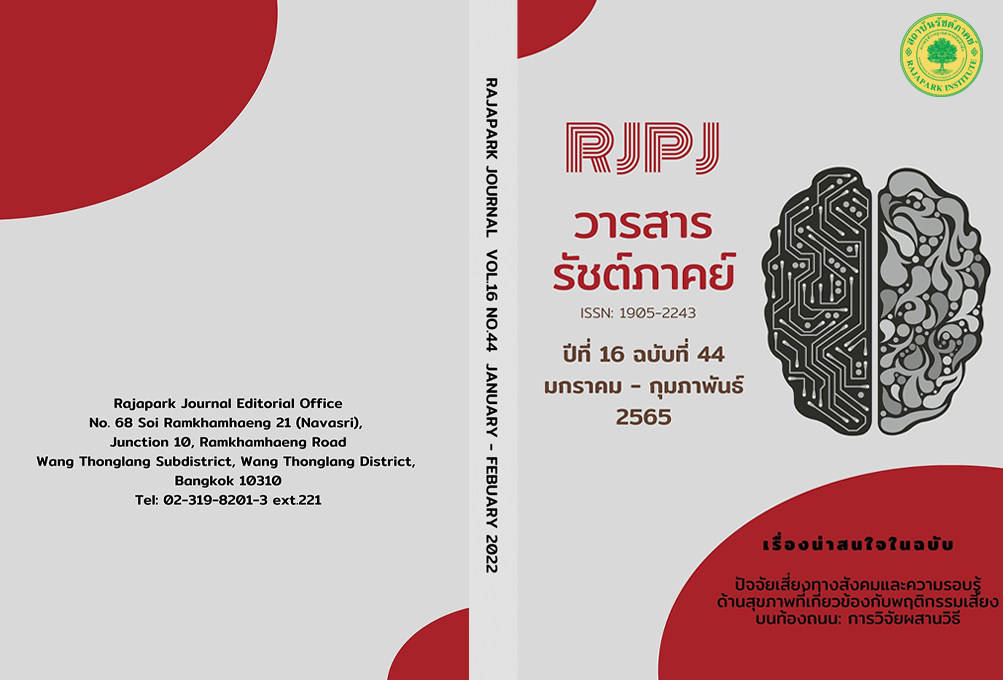Japanese Work Culture Affecting the Work Efficiency of Thai Employee in Japanese Companies in Bangkok Metropolitan Region
Main Article Content
Abstract
The objectives of this research were 1) The differences of demographic factors affecting the work efficiency of Thai employees in Japanese companies in the Bangkok metropolitan region, 2) The relationship of Japanese work culture factors affecting the work efficiency of Thai employees in Japanese companies in Bangkok metropolitan region, and 3) The opinions of the relationship of Japanese work culture factors affecting the work efficiency of Thai employees in Japanese companies in Bangkok metropolitan region. The research used mixed methods. This quantitative research was conducted by collecting the data through questionnaires. The research sample was 400 respondents. Therefore, the results of the data analysis were specifically studied to be used as a guideline for data collection with in-depth interviews from five key informants and qualitative analysis. The hypotheses showed that genders, age, average monthly income, and years of working affected the work efficiency of Thai employees in Japanese companies in the Bangkok metropolitan region differently. The Ho-Ren-So factor, the teamwork factor, the employee development factor, and the Kaizen factor were statistically relevant at the significance level of 0.05., and from in-depth interviews according to such factors can be used to achieve the work efficiency in quality, quantity, time, cost, and customer satisfaction.
Article Details

This work is licensed under a Creative Commons Attribution-NonCommercial-NoDerivatives 4.0 International License.
Views and opinions appearing in the Journal it is the responsibility of the author of the article, and does not constitute the view and responsibility of the editorial team.
References
Bangkok Biz News. (2021). 'JETRO' Points Out Japanese Companies in Thailand Ignore Covid, Add 400 More Businesses. Retrieved June 6, 2021, from https://www.bangkokbiznews.com/news/detail/929825
Bangkok Insight. (2021). JETRO Pointed out that Thailand is Still an Attractive Investment, Even Though the Political Situation is Still Worrying. Retrieved June 10, 2021, from https://www.thebangkokinsight.com/444223
Cochran, W. G. (1953). Sampling Techniques. New York: John Wiley & Sons. Inc.
Denzin, N. K. (2009). The Research Act. A Theoretical Introduction to Sociological Methods. New York: Routledge. https://doi.org/10.4324/9781315134543
Department of Foreign Trade. (2018). Manual for the use of Trade Privileges Japan GSP Project, JTEPA, and AJCEP. Bangkok: Department of Foreign Trade.
Eitaro, K. (2014). If you change the way you work by just 1%, you will be able to outperform the other 99%. [99%
no hito ga shiteinai 1% no shigoto no kotsu]. (Phahanich, T., Translator). Bangkok: We Learn. (2012).
Fact-Link Japan-Thailand Industrial directory. (2021). Companies listed on Fact-Link Thailand. Retrieved June 28, 2021, from https://fact-link.com/special_list.php?offset=30&lang=th
Firkola, P. (2006). Japanese Management Practices Past and Present. Economic Journal of Hokkaido University, 35(1), 115-130.
Haghirian, P. (2010). Understanding Japanese Management Practices. New York: Business Expert Press.
Kanjanawasee, S. (2001). Choosing the Right Statistics for Research. Bangkok: Boonsiri printing.
Khampekkhruea, R. (2016). The Relationship Between Organizational Culture and Job Performance A Case Study of a Thai-Japanese Company(Unpublished Independent Study). Bangkok: Thai-Nichi Institute of Technology.
Kongnonkok, P. (2018). Opinions Towards Japanese Administrative Styles and Job Satisfaction Among Thai Employees Working for Japanese Companies in Amata Nakorn Industrial Estate, Chonburi Province(Unpublished Independent Study). Burapha University.
Miles, M. B., & Huberman, A. M. (1994). Qualitative Data Analysis. An Expanded Sourcebook (2nd ed.). Thousand Oaks, CA: Sage.
Muanmaroeng, P. (2020). Impacts of Work Cultures in Japanese Companies on Work Performance in 304 Industrial Park Prachinburi Province(Unpublished Independent Study). Ramkhamhaeng University.
Pattiyathanee, S. (2003). Educational Measurement (2nd ed.). Kalasin: Prasan Printing.
Pawasarn, W. (2019). KAIZEN (Handout of HRM-407 Kaizen Management). Bangkok: Thai-Nichi Institute of Technology.
Pongbungor, O. (2020). Handout of BUS-301; Japanese Organizational Culture and Human Resource Management. Bangkok: Thai-Nichi Institute of Technology.
Rupawichet, P. (2011). Management Style Learning: Cross Culture Manage. Bangkok: Duangkamol Publishing.
Siengthai, S. (2015). Japanese-Style Human Resource Management in Thailand. Japanese Studies Journal, 32(2), 1-17.
Somjit, N. (2017). Enhancing the Productivity of the Quality Control Department(Independent Study). Thai-Nichi Institute of Technology.
Tedjor, K. (2018). A Study of Organizational Communication, Teamwork and Organizational Culture Affecting Employees’ Effectiveness in MFEC Public Company Limited(Independent Study). Bangkok University.
Wannarot, S. (2017). The Increasing of Performance Efficiency by Using Kaizen Concepts: Case Study S Pund Company, Ltd.(Master of Business Administration). Rajabhat Rajanagarindra University.
Warintaranwat, S. (2011). Perspectives from the Survey Data on the Status Education Project and Trend of Business Relocation of Japanese Companies to Thailand. TPA News, 16(187), 50-51.


